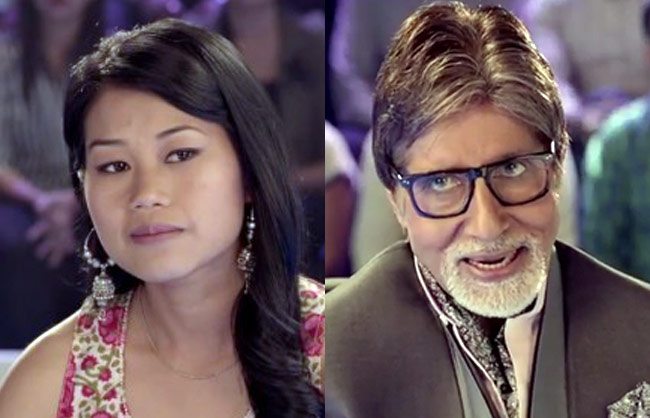There was a time when advertisements and short videos during a program would only cause one irritation as they were used primarily for marketing, alluring consumers and sustaining the television industry.
However, in the last year, there has been an arguably emerging trend in India, especially with the advent of YouTube short clips, that advertisements now have a meaningful purpose to send influential messages not just within India but for the Diaspora community outside of India.
Mega star and Bollywood living legend Amitabh Bachchan is now coming back with another season – Kaun Banega Crorepati – India’s version of Who Wants to Be a Millionaire. Unlike advertisements that were used to promote the show itself, the most recent advertisement for the show drew attention to the recognition of North east Indians who are usually stereotyped and called “Nepalis” and mistakenly named “Chinese” as Indians.
This one-minute-and half video generated a buzz and went viral as it sent a powerful message indicating the blatant racism that continues to exist in India that sidelines people who are from the North east. In the video, Bachchan asks the North-eastern contestant, Poornima, which country does the capital Kohima belongs to. Asking for an audience poll, a couple of men mock her. The audience poll responds “India.” In Hindi, Bachchan responds to her “Kohima is in India, this is a fact!” Poornima, in a heart-touching statement says, “Everyone knows it but how many accept it?”
Earlier in this year in February, a recent street brawl in India which led to the death of a young student from Arunachal Pradesh brought this issue to the light as North-east Indians face the challenge of being accepted into an already diverse and complex country. As the North-east Indian community in India campaigns for anti-racism legislation, much of the country is in denial for its inherent racism towards men and women who migrate from the “seven sister” states to cosmopolitan cities like Delhi, Bombay, and Bangalore to make a better living for themselves.

Kaun Banega Crorepati Advertisement
Kim, a call center worker from Manipur told Al Jazeera, "Men in Delhi treat us as if we are loose women. Just the other day, I was standing at the pickup point for my office cab to take me to Faridabad. There was another woman next to me from northern India working for a tech company; we both were in formals. A car pulls up and the man asks, 'Madam do you need a ride?' His look and his voice made it clear what he was looking for.”
In a little more than a minute, KBC’s advertisements have brought the issue of India’s racism to light. More recently, child sexual abuse and sexual education in schools has also been a prevalent issue. Short satires and cartoons are now being used to highlight the importance of these issues especially after a recent rape case of a six-year-old in a well-known school in Bangalore.

East India Company's Video On Sex Education
Released by East India Company, the video highlighted the way in which the school system in turn the society suppresses teaching children about sex. Particularly funny is that the teacher does not even use the word “sex” instead a glass of milk is emblematic of the wedding night. Furthermore, he shows the class a video of a man who dies from having pre-marital sex and contracting disease from his girl friend trying to scare the students.
The video, though, does more than just highlight about the way in which sex education is tabooed in India but also highlights gender inequalities that continue to be present in the nation. For example, the middle class “modern” girl student who raises her hand is ignored by the teacher. The other two girls are shown holding babies, silent, and wearing a dupatta to indicate their traditional mannerisms.
Also, cartoon videos are also being used to highlight the pressing issue of child sexual abuse, which earlier came into the Indian discourse thanks to Kalki Koelchin's confession during the campaign earlier this year. Released by ChildLine on Youtube, by using graphic art as a way to spread the message is ingenious on their part as it spreads the message and subsequently, makes it relatable and accessible to children!
Images Courtesy of /media2.intoday
Nidhi Shrivastava
Author
Nidhi Shrivastava (@shnidhi) is a Ph.D. candidate in the English department at Western University and works as an adjunct professor in at Sacred Heart University. She holds double masters in South Asian Studies and Women's Studies. Her research focuses on Hindi film cinema, censorship, the figure o...














































































































